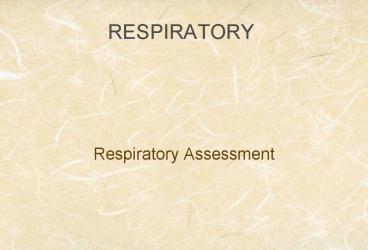RESPIRATORY - PowerPoint PPT Presentation
1 / 11
Title:
RESPIRATORY
Description:
Patient unable to swallow or cough & expectorate. Audible wheezing ... Adventitious lung sounds. Rhonchi. Partial obstruction of the larger airways ... – PowerPoint PPT presentation
Number of Views:54
Avg rating:3.0/5.0
Title: RESPIRATORY
1
RESPIRATORY
- Respiratory Assessment
2
Respiratory Assessment
- Visual Evaluation or Inspection (LOOK)
- Is the pt breathing comfortably?
- IE ratio normally 12
- Is the chest and abdomen moving in synchrony?
- Versus paradoxical breathing
- Is the chest expanding symmetrically?
- Is the patients skin color pink?
- Check nail beds, mucosa
3
Respiratory Assessment
- LISTEN w/o a stethoscope
- Upper Airway Obstruction
- Stridor
- Audible Secretion
- Patient unable to swallow or cough expectorate
- Audible wheezing
- Partial obstruction or narrowing of the larger
airways
4
Respiratory Assessment
- FEEL
- Feel the patients chest for
- Symmetrical chest expansion
- Lower ribs should flare indicating use of
diaphragm - Tenderness or injury
- Trauma, surgery
- Missing ribs
- In the 1950s ribs were removed for lung
resection
5
Respiratory Assessment
- Visual Cues of Respiratory Distress
- Abnormal breathing pattern
- Tachypnea
- gt 20 breaths per minute
- Paradoxical breathing pattern
- Seesaw pattern abdomen protrudes, chest retracts
on inspiration - Nasal flaring
- Orthopnea
- Intercostal retractions
- Pallor, grayish, or bluish skin color
- Clubbing of the digits
6
Respiratory Assessment
- Auditory Cues
- Adventitious lung sounds
- Rhonchi
- Partial obstruction of the larger airways
- Secretions, tumor external or internal
- Wheezing
- Bronchospasm (edema, secretions)
- Bronchoconstriction (decreased lumen diameter)
- Absent (fluid, foreign body)
7
Respiratory Assessment
- Other cues of Respiratory Distress
- Increased heartrate
- Increased blood pressure
- grunting
- Primarily premies and neonates
- Decreased mentation
- Combative, anxiousness, restlessness
- hallucination
8
Respiratory Assessment
- Reasons for Respiratory Distress
- (4) hypoxias
- Hypoxic hypoxia
- High altitude, pneumonia, ARDS, pneumothorax
- Hemic or anemic hypoxia
- hemorrhage
- Circulatory or stagnant hypoxia
- Cardiac arrest
- Histoxic hypoxia
- Cyanide poisoning
9
Respiratory Assessment
- Chief Complaint
- Dyspnea
- Subjective, i.e., pt feels SOB
- Hypoxemia (Objective)
- Physical measurement of reduced oxygen in the
blood - Pulse oximetry - SpO2
- ABG - PO2, SaO2
10
Respiratory Assessment
- Clinical thoughts
- What caused the SOB? How long?
- Smoking Hx? If so, PPY?
- Gradual (insidious) or sudden (acute)?
- What aggravates the SOB and what is done to
alleviate it? - Cough?
- NPC or productive
- Amount, color, odor, consistency
- Fever? Pain? Any meds taken?
11
Respiratory Assessment
- So now what? Recommendations
- Inductive thinking process to determine what
- Do nothing?
- Oxyen Rx?
- Bland aerosol Rx?
- Medicated aerosol Rx?
- Secretion Management?
- Intubate and mechanically ventilate--Nah, later































